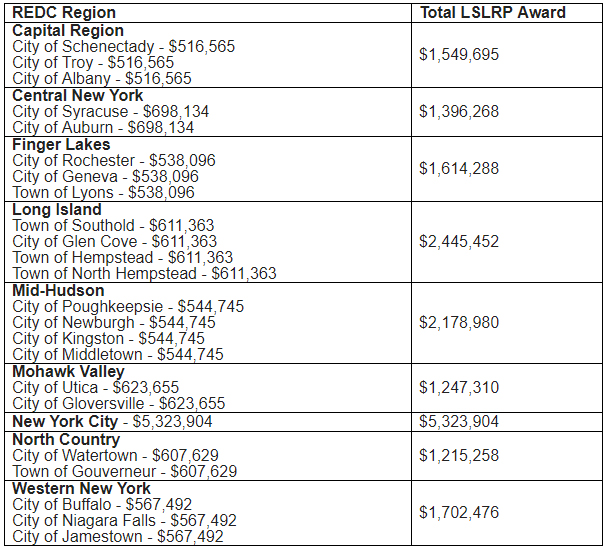Albany, NY - November 27, 2017 - Governor Andrew M. Cuomo today announced that $20 million dollars will be awarded statewide to replace residential drinking water lead service lines as part of New York's Clean Water Infrastructure Act of 2017.
"These critical improvements to New York's drinking water infrastructure are vital to protecting public health and to laying the foundation for future growth and economic prosperity in these communities," Governor Cuomo said. "With this $20 million award, we are helping to protect residents and their families across this state and are creating a stronger, healthier New York."
The Lead Service Line Replacement Program 2017 municipal awardees are:

Drinking water can be a source of lead exposure when service pipes that contain lead corrode, especially when the water has high acidity or low mineral content. The use of lead in residential water service lines began decreasing in the 1930s because of the evolution of regulations and construction practices; however, significant amounts of lead can leach into water when older service lines, brass or chrome-plated brass faucets and fixtures with lead solder corrode. The US Environmental Protection Agency estimates that drinking water contaminated with lead can contribute to 20 percent or more of a person's total lead exposure. Infants who consume mostly mixed formula can receive 40 to 60 percent of their exposure to lead from drinking water.
Health Commissioner Dr. Howard Zucker said, "Public health begins with access to clean drinking water, and reducing lead exposure, especially in children, should always be a top priority. This state-wide program to replace residential lead pipes in areas of the state that need it most will improve the health of New Yorkers."
In the SFY 2017-2018 budget, NYS created the Clean Water Infrastructure Act of 2017. As part of this Act, NYS created the Lead Service Line Replacement Grant Program, which allowed the Department of Health to appropriate grant funds for the replacement of lead service lines. Municipalities were determined to be eligible to participate in the LSLRP based on the following criteria: percentage of children with elevated blood levels, median household income, and the number of homes built before 1939. Grants will be used to replace residential lead service lines from the municipal water main to the residence.
The Lead Service Line Replacement Program is the latest initiative in the State's overall Childhood Lead Prevention efforts which began in 2007 with funding to local health departments to target at-risk neighborhoods, implement prevention activities, and promote lead testing and public awareness of the dangers of lead poisoning. In 2016, Governor Cuomo took the unprecedented and aggressive step to mandate lead testing and remediation for drinking water in public schools and required public notification of results.
Lead poisoning is caused by swallowing or breathing in lead and is especially bad for young children whose brains are still developing. Lead can harm a child's growth, behavior, and ability to learn. Women who are pregnant, or planning to become pregnant should take extra care to avoid lead as it can be harmful to babies before they are born.
New York State requires health care providers to test all children for lead with a blood lead test at age 1 year and again at age 2 years. At every well-child visit up to age six, health care providers must ask parents about any contact their child might have had with lead. If there's been a chance of contact, providers are required to test for lead again. Parents can ask their child's doctor or nurse if their child should get a lead test, and what the lead test results mean.
For more information about New York's Lead Service Line Replacement Program click here.
For more information about New York's Childhood Lead Poisoning Prevention Program, click here.
For more information about the Lead Testing in Schools Program, click here.










